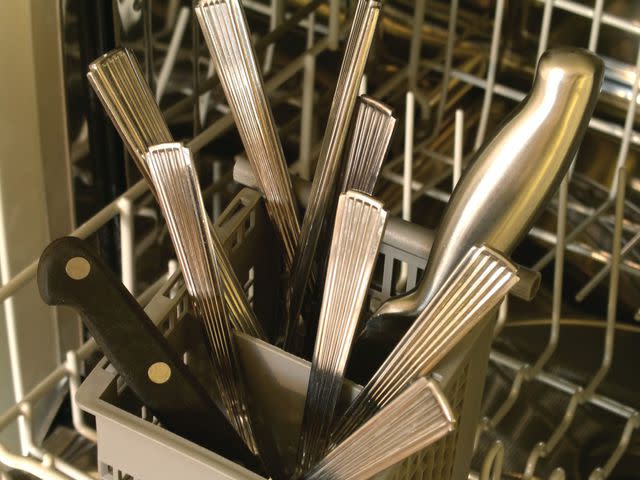Should You Point Silverware Up Or Down In The Dishwasher?
An expert explains whether or not the orientation of your silverware in the dishwasher matters.
When it comes to using the dishwasher, it's not always as simple as "load and go." There's actually an art to loading the dishwasher, and it will look different depending on the brand and model you own. Plus, your utensils, dishware, and favorite coffee mugs will only be as clean as your dishwasher is (yes, it needs cleaning, too).
Thankfully, one of the simplest things we can do to make sure our utensils get sparkling clean is to know which direction to place them in when loading the dishwasher. We asked cleaning expert and founder of @thecleaningchannel, Hailey Becnel, the right way to get it done.
Meet The Expert
Hailey Becnel is a cleaning expert and the founder of @thecleaningchannel.
Tips for Silverware Washing
"First, I always recommend reading your dishwasher's manual," says Becnel. Proper cleaning and loading methods can even differ in products made by the same brand, and it's important to pour over your manual to keep that expensive appliance (and your beloved glassware) in tip-top shape for years to come.
"A good rule of thumb is to start by purchasing a high-quality detergent," says Becnel. "My favorite is Cascade because it is guaranteed to leave your silverware sparkling." Not only that, but considering a rinse aid to add to the cycle will help your flatware, glass and dishes dry without droplet or streaking left behind.

Should You Point Silverware Up Or Down?
When it comes to actually loading your forks, spoons, and knives in the dishwasher, the cleaning pro says that the best way to load utensils, in her opinion, is with their handles up and sharp edges down. She says this is especially important if you have children in the house, as silverware that faces with sharp edges up can be a safety hazard.
"I also do it this way because it's the most sanitary option when I unload the dishwasher," she says. Picking up forks by their prongs with your fingers, especially if unwashed, can just cause the build up of germs and bacteria, negating some of the work your dishwasher just accomplished. It's important to remind any family member who helps unload the dishwasher of this tip!
Becnel also notes that people who have plastic utensils should always place them on the top rack, near the front of the dishwasher. You'll also want to avoid using sanitizing cycles or any other cycle that requires higher temperatures for washing and/or drying if washing plastic dishware, cups, and utensils in this appliance because high heat can cause plastic to degrade and leach any chemicals it contains into the dishwasher.
Additional Care Tips
Becnel says that knives besides butter knives should always be hand-washed. She says running your favorite chef's or paring knife once or twice a week through the dishwasher can cause it to dull faster, making it less effective and safe to use.
But what about that silver-plated flatware passed down by your grandmother? The good news is, that, with the right detergent and know-how, it's plenty safe to toss in the utensil basket of your dishwasher. Just be sure to wash these pieces separately from other utensils, and if you're worried about it tarnishing, consider storing your set with a piece of chalk to keep discoloration at bay.
What You Might Not Know About Your Dishwasher
There are certain things you should never put in the dishwasher, and others items that can be washed in this appliance that may surprise you. We've got some tips regarding your china and silver service, and some options that will aid in the cleanliness of this kitchen necessity.
To Wash Or Not To Wash?
There are many items that may not be included in a dishwasher cycle. Whether an item is hand painted, or making the mistake of dulling one's knives from too much exposure to a dishwasher, following a few rules will maintain important culinary items. On the other side of the fence are a few things you would be shocked to find that you can wash in your dishwasher. Take a look!
Related: 22 Things You Should Never Put In The Dishwasher
Related: 12 Surprising Things You Can Wash in the Dishwasher
The Miracle Of Dishwasher Salt
For those of you out there with hard water issues, dishwasher salt counteracts hard water. Large-grained dishwasher salt consists of pure sodium chloride, which bonds (remember that from chemistry class?) with the calcium and magnesium in the water, making them harmless. This "softening" process results in cleaner dishes, a longer-lasting dishwasher, and spot-free glassware.
Your Heirlooms Are Safe, With Some Exceptions
If you are seeking answers surrounding heirloom china, you may be led to hand washing as the safest method to clean. However, more modern sets of china can withstand a dishwasher on a gentle cycle. Ultimately you need to look to manufacturer standards to see what is appropriate. As far as your silver-plated flatware is concerned, you may be surprised to know that a cycle in the dishwasher can bring out the shine with just a few adjustments to your approach.
For more Southern Living news, make sure to sign up for our newsletter!
Read the original article on Southern Living.

